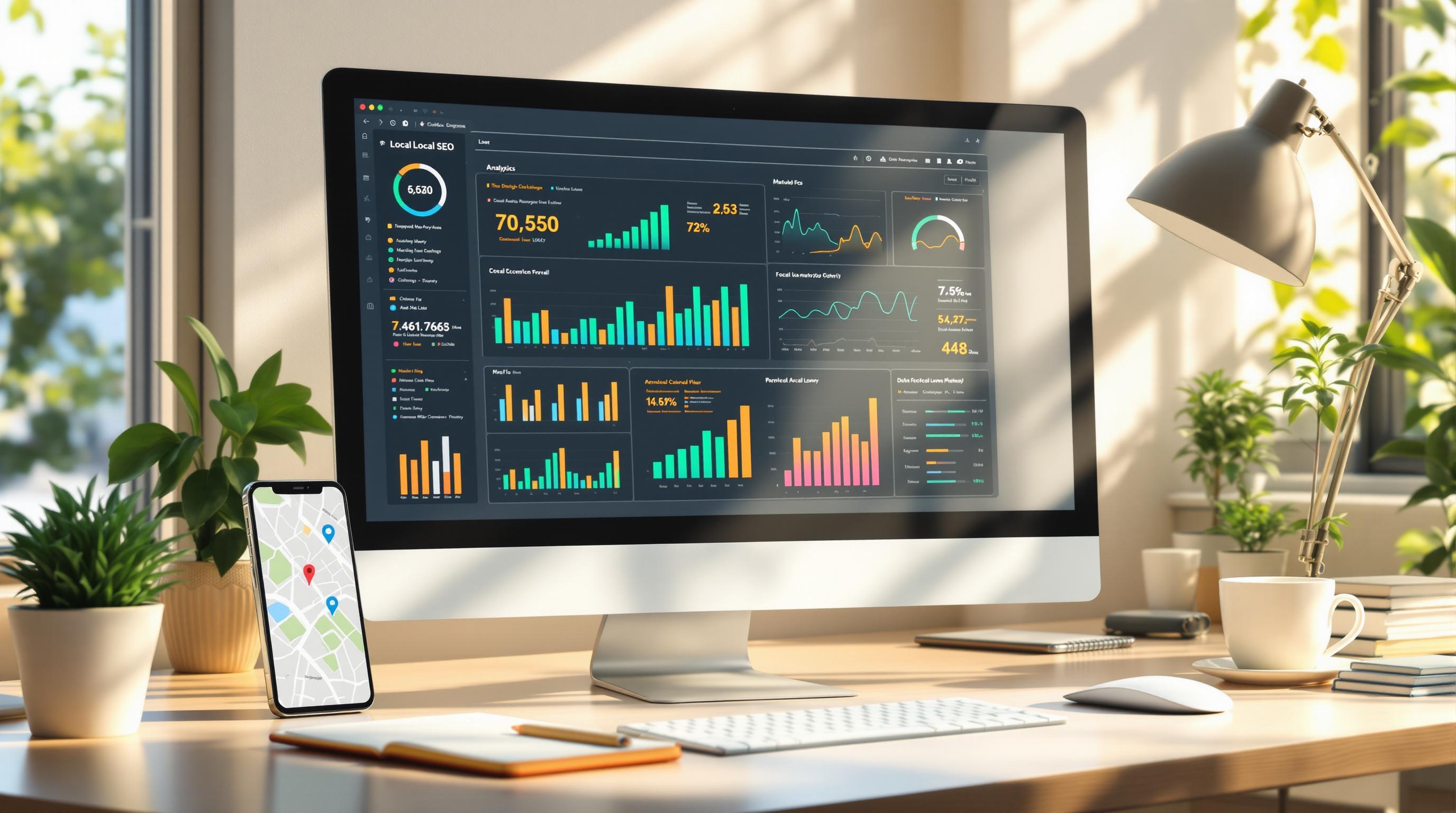Want more campers? You need SEO. Here's why:
- 70% of people research businesses online before visiting
- 95% of search traffic goes to the first page of results
- Organic search drives over half of all website traffic
This guide will help you:
- Find the right keywords
- Create content that ranks
- Optimize for local searches
- Set up your website for success
- Measure your results
Key takeaways:
- Use specific, long-tail keywords like "pet-friendly campgrounds in the Smoky Mountains"
- Create high-quality content that answers campers' questions
- Optimize your Google Business Profile and local listings
- Ensure your website is mobile-friendly and fast
- Track your progress with Google Analytics and adjust your strategy
Remember: SEO takes time, but it's worth it. One campground saw a 200% increase in bookings after focusing on local SEO.
Ready to get your campground on the digital map? Let's dive in.
Featured Video: SEO for Beginners
SEO Basics for Campgrounds
Let's talk about SEO for your campground. It's not just sprinkling keywords on your website. It's about creating a digital beacon that draws the right outdoor enthusiasts to your campsite.
Main SEO Parts for Campgrounds
Think like a camper. What would they search for? How can you make your site stand out in search results?
First up: keywords. But not just any keywords – we're talking specific phrases that match what campers want. For example, "pet-friendly campgrounds in the Smoky Mountains" instead of just "campgrounds".
Here's what you need to focus on:
- On-page optimization: Put those keywords in your title tags, meta descriptions, headers, and content. But remember, write for humans first.
- Content creation: Write blog posts, area guides, and activity suggestions that campers will find useful.
- Technical SEO: Make your site load fast. Aim for under two seconds.
- Mobile-friendliness: Most people plan trips on their phones, so your site needs to look good on small screens.
Why Local SEO Matters
Local SEO is your secret weapon. It's like having a local guide for the internet.
Why is it so important for campgrounds? When someone searches for "campgrounds near me" or "best camping in [Your Area]", you want to be at the top of the list.
Local SEO helps you:
- Show up in Google Maps searches
- Appear in the top 3 local business results Google shows
- Attract nearby campers looking for a quick getaway
Sarah from Pinewood Retreat shared: "After focusing on local SEO, we saw a 200% increase in bookings from nearby cities. We suddenly became visible to a whole new group of weekend campers!"
Numbers That Matter
Let's look at some stats:
- 70% of people research a business online before visiting. That's a lot of potential campers checking you out online.
- 95% of search traffic goes to the first page of results. If you're not there, you're missing out.
- Organic search accounts for 53.3% of all website traffic. That's more than half of your potential visitors coming from search engines!
But here's the thing: you can't just set it and forget it. Keep an eye on your progress. Use Google Analytics to track your organic traffic. Watch for increases during peak camping seasons – that's when you know your SEO efforts are paying off.
Finding the Right Search Terms
Picking the perfect search terms is like setting up camp. It takes some work, but it pays off. Let's explore how to choose terms that'll attract more campers to your website.
How to Find Good Keywords
Think like a camper. What would they type into Google when looking for a spot like yours? Here's how to find those golden keywords:
1. Use keyword research tools
Google's Keyword Planner and KeywordsFX can show you what people are searching for. "Pet-friendly campgrounds in the Smoky Mountains" might get more searches than just "campgrounds".
2. Look at your website analytics
Check what terms people are already using to find you. You might spot keywords you've missed.
3. Check out camping forums
See how campers talk about their trips. This can help you find specific, long-tail keywords.
Focus on terms that show booking intent, like "best campgrounds for families in [Your Area]" or "RV parks with full hookups near [Nearby Attraction]".
Using Location Keywords
Location is key in camping and SEO. Here's how to use location-based keywords:
- Be specific: Use "campground in [Your Town] [Your State]" instead of just "campground".
- Target nearby attractions: Include popular spots in your keywords. For example, "campgrounds near Yellowstone National Park".
- Use "near me" phrases: Many campers search for "campgrounds near me". Clear location info helps Google understand where you are.
"After we started using location-specific keywords like 'lakeside camping in the Adirondacks', our organic traffic from nearby cities increased by 150% in just three months." - Sarah from Pinewood Retreat
Keywords for Seasons and Activities
Camping changes with the seasons. Your keywords should too:
- Winter keywords: "winter camping spots", "snowshoeing campgrounds"
- Summer keywords: "family summer camp sites", "best campgrounds for stargazing"
- Activity-based keywords: "campgrounds with kayak rentals", "hiking trails near campgrounds"
REI, the outdoor gear retailer, uses this strategy well. They boost content around "summer camping gear" in late spring, ready for the summer camping search surge.
Learning from Other Campgrounds
Don't start from scratch - learn from successful campgrounds:
1. Check out their websites
Look at the words they use in titles, headings, and content.
2. Use SEO tools
Tools like SEMrush or Ahrefs can show you what keywords other campgrounds rank for.
3. Analyze their content
What topics do they cover in blogs or guides? This can spark ideas for your content strategy.
Writing Content That Works
Creating content that pulls in visitors and turns them into happy campers is key for your campground's success. Let's look at how to make your content stand out.
Best Types of Content
Mix it up with your campground content. Here's what works well:
Landing Pages: These are your heavy lifters. Make a page for each special thing you offer. Got RV sites with all the hookups? Create a page that shows off every perk and convenience.
Blog Posts: Show what you know about camping and your area. Write about cool hiking trails nearby or how to spot constellations at your campground. It's good for SEO and makes you look like a pro.
Visual Content: Campers want to see what they're getting. Use top-notch photos and videos of your campground, the surrounding nature, and happy campers to really sell the experience.
RoverPass, a campground booking platform, says:
"Content is the main way to communicate with your potential customers and persuade them to choose your campground over your competitors."
Always make sure your content gives something useful. Whether it's info, fun, or fixing a problem, every piece should have a point.
Making Location Pages Better
Your location pages are gold for local SEO. Here's how to polish them:
- Use Local Keywords: Sprinkle in location-specific terms naturally. Don't just say "campground", say "lakeside campground in the Adirondacks".
- Highlight Nearby Attractions: Talk about popular spots around you. It helps with SEO and shows campers what fun stuff they can do.
- Include Maps and Directions: Put Google Maps on your location pages. It makes things easier for users and search engines like it too.
- Add Local Schema Markup: This special code helps search engines get your location info better.
Sarah from Pinewood Retreat shared a win:
"After optimizing our location pages with local keywords and information about nearby attractions, our organic traffic from nearby cities increased by 150% in just three months."
Planning Content by Season
Camping happens all year, but what people want changes with the seasons. Plan your content like this:
Spring: Write about spring camping tips, the best wildflower hikes, and getting your RV ready for camping season.
Summer: Cover family-friendly summer activities, how to stay cool while camping, and the best spots for stargazing.
Fall: Talk about camping during fall foliage, cozy campfire recipes, and watching autumn wildlife.
Winter: Share winter camping gear essentials, snowshoeing trails, and how to camp safely in cold weather.
The Vista Social Team says:
"Planning your year with seasonal content is the key to staying relevant the whole year."
Make a content calendar to stay ahead. This way, you'll have the right content ready when campers start planning their trips.
sbb-itb-e98aa53
Getting Found in Local Searches
Want more campers? You need to nail local searches. Here's how to make your campground pop up when people are looking for a spot to pitch their tent or park their RV.
Setting Up Google Business
Think of your Google Business Profile as your campground's digital billboard. Here's how to make it work for you:
- Claim and verify your listing. It's step one for a reason.
- Fill it with the good stuff. Name, address, phone, website, hours - sure. But don't stop there. Add high-res photos of your best sites, that killer lake view, or happy campers around a fire.
- Write a description that sells. What makes your campground special? Best stargazing in the state? Most pet-friendly sites around? Tell people about it.
- Keep it fresh. Regular updates show you're on the ball. Post about upcoming events, seasonal deals, or new stuff you've added.
Sarah from Pinewood Retreat saw real results:
"We spruced up our Google Business Profile with seasonal photos and weekly updates about local events. In just two months, profile views jumped 35% and website clicks went up 20%."
Getting Listed in Local Directories
Don't put all your eggs in one basket. Spread out across different local directories:
- TripAdvisor: It's a must.
- Yelp: Not just for restaurants anymore.
- Local tourism boards: Get on your area's official tourism site.
- Camping-specific directories: Places like Campendium, The Dyrt, or Hipcamp can drive serious traffic.
Pro tip: Use the exact same name, address, and phone number everywhere. It helps search engines trust you more.
Managing Online Reviews
Reviews can make or break you online. Here's how to handle them:
- Ask happy campers to share. After a great stay, send a quick email asking for a review. Make it easy with direct links.
- Respond to every review. Good or bad, they all deserve a response. Thank the good ones. For the bad ones, address the issue and offer to make it right.
- Use feedback to improve. If multiple reviews mention slow Wi-Fi, maybe it's time for an upgrade.
Amber Simpson from Martrek Digital nails it:
"Your Google My Business profile is like a neighborhood beacon. It's not just about being seen; it's about showing you're an active, responsive part of the community."
Reaching Local Audiences
Getting found is great, but reaching out is even better. Try these:
- Create local content. Write about nearby attractions, hiking trails, or seasonal events. It helps with SEO and shows you know your stuff.
- Use geo-targeted ads. Platforms like Google Ads or Facebook let you target nearby cities or states.
- Team up with local businesses. Partner with outdoor gear shops, tour guides, or restaurants. You can tap into each other's customer base.
- Engage locally on social media. Use location tags and local hashtags. Chat with other local businesses and community pages to boost your visibility.
Website Technical Setup
Your campground's website is your digital front desk. It needs to be as welcoming and functional as your actual campground. Here's how to make it shine:
Mobile-Friendly Design
Imagine this: A family's cruising through the mountains, hunting for a campsite. They pull over and grab their phones. If your site's not mobile-friendly, you've just lost them.
Here's the scoop:
- 60% of campers use smartphones to browse camping options.
- Over half of all web traffic comes from mobile devices.
Brian Searl, a camping industry expert, doesn't mince words:
"Responsive design is a non-negotiable element of a successful campground online presence."
What can you do?
- Use responsive design. Your site should look good on any screen size.
- Test it out. Use Google's Mobile-Friendly Test tool to check your site's performance.
- Make it thumb-friendly. No one wants to play finger Twister on their phone screen.
Speed It Up
Speed's a big deal. Google says shaving off just 0.1 seconds from your load time can boost conversions by 8%. That's huge!
Here's how to rev up your site:
- Shrink those images. Use tools like TinyPNG to compress without losing quality.
- Use caching. It's like giving your site a memory boost.
- Pick a solid host. A slow host is like a campground with no roads leading to it.
- Clean up your code. Ditch unnecessary plugins and streamline your site.
Kato Nkhoma, a website optimization expert, puts it this way:
"With site speed being a critical SEO, UX, and CRO element, you can't afford to neglect it."
Schema Markup: Your Secret Weapon
Think of schema markup as your site's secret handshake with search engines. It helps Google understand exactly what you're offering.
Here's what you need:
- Use LocalBusiness schema. It tells search engines you're a real place with an address.
- Include the essentials: Name, address, phone number, hours, and price range.
- Don't forget reviews. If you've got great ones, show them off!
Here's a quick example:
{
"@context": "https://schema.org",
"@type": "Campground",
"name": "Pine Valley Campground",
"address": {
"@type": "PostalAddress",
"streetAddress": "123 Forest Road",
"addressLocality": "Pine Valley",
"addressRegion": "CA",
"postalCode": "91962",
"addressCountry": "US"
},
"telephone": "+1-555-123-4567",
"openingHours": "Mo-Su 00:00-24:00",
"priceRange": "$$"
}
This code goes in your website's header. Visitors won't see it, but search engines will eat it up.
Checking Results and Making Changes
You've optimized your campground's online presence. Now let's see if it's working. Here's how to track your SEO results and tweak your strategy based on real data.
Tracking Your Bookings
Want to know if your SEO is bringing in more campers? Here's the trick: connect Google Analytics 4 (GA4) to your booking platform.
Add your GA4 Measurement ID to your booking page, and within 48 hours, you'll start seeing data. GA4 tracks key events like:
- Add Credit Card
- Add To Cart
- Remove From Cart
- Begin Checkout
- Purchase
This shows you exactly how visitors interact with your booking process.
"After connecting GA4 to our booking platform, we found 65% of our bookings came from organic search. It justified our SEO investment", says Sarah from Pinewood Retreat.
Checking Search Rankings
Your search rankings are your campground's digital real estate. Higher rankings mean more visibility.
To track your rankings:
- Set up a campaign in Semrush's Position Tracking.
- Monitor daily rankings for key terms like "campgrounds in [Your Area]".
A 0% visibility score means you're not in Google's top 100 results for any tracked keywords. Aim for 100% - that's the top spot for all your keywords.
Understanding Visitor Behavior
It's not just about getting visitors - it's about what they do on your site.
GA4 lets you track:
- User navigation paths
- Time on each page
- Bounce rates
Focus on your booking page. Are visitors getting there but not booking? You might need to improve your booking process.
Measuring Cost vs. Results
Is your SEO investment paying off? Here's how to calculate your ROI:
(Gain from Investment – Cost of Investment) / Cost of Investment
Let's say you spent $10,000 on SEO over six months and got $70,000 more in bookings.
Your ROI: ($70,000 - $10,000) / $10,000 = 6 or 600%
That's a 600% return!
Remember, SEO takes time. You'll usually see big results after six months. But when it works, it works well.
Keep tracking these metrics and be ready to change things up. If something's not working, try something new. SEO is all about getting better over time.
Wrap-Up
Let's recap the key points to boost your campground's online visibility and bookings:
Keyword research is crucial. Start with terms relevant to your campground. Use Google's Keyword Planner to find hidden gems. Long-tail keywords like "pet-friendly campgrounds in the Smoky Mountains" can be game-changers.
Quality content wins. Create content that answers campers' questions. As Brian Searl notes:
"Content is and always will be king, but the difference between mediocre content that was written in five minutes for SEO and content written in a few hours for human consumption is what sets you apart."
Local SEO matters. Optimize your Google Business Profile. Keep it updated with fresh content and great photos. Sarah from Pinewood Retreat saw real results:
"After focusing on local SEO, we saw a 200% increase in bookings from nearby cities. We suddenly became visible to a whole new group of weekend campers!"
Mobile-friendly is a must. With 60% of campers using smartphones to browse, your site needs to look good on small screens. Use responsive design and test often.
Track and adapt. Use Google Analytics to monitor your progress. Keep an eye on organic traffic, conversion rates, and ROI. SEO takes time, so be patient but ready to tweak your strategy based on data.


